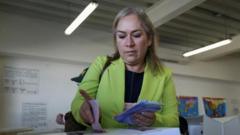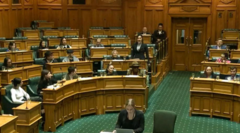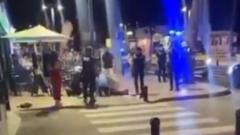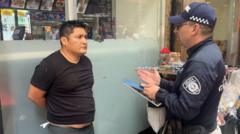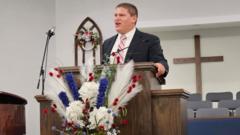Father Marcelo Pérez, a Jesuit priest known for his advocacy for indigenous rights in Chiapas, Mexico, has been fatally shot following a Mass. This tragic event underscores the ongoing battle against organized crime and violence in the region, leading to widespread calls for justice from religious and community leaders alike.
Outrage in Chiapas: Priest Killed for Speaking Against Cartel Violence
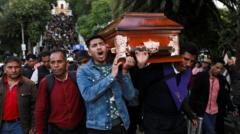
Outrage in Chiapas: Priest Killed for Speaking Against Cartel Violence
The assassination of Father Marcelo Pérez has ignited a fierce reaction in Chiapas as violence escalates.
In a shocking incident that has sent ripples through the community in Chiapas, Father Marcelo Pérez, a prominent Catholic priest and fervent advocate for indigenous rights, was gunned down shortly after conducting a Sunday Mass. This brazen act of violence occurred in San Cristóbal de Las Casas, a city increasingly plagued by cartel-related bloodshed. The attacker, riding on a motorcycle, opened fire on Father Marcelo’s vehicle, claiming the life of a man celebrated as a champion of the Tzotzil indigenous people and a symbol of resistance against the oppressive violence that organized crime has unleashed.
The Jesuit Order emphasized that his assassination should not be viewed as a solitary incident, but rather as part of a troubling trend of violence that is sweeping through Chiapas. They highlighted Father Marcelo's significant contributions over the past 20 years, standing up for the dignity of marginalized communities and advocating for genuine peace amidst escalating conflict. "Father Marcelo has been a symbol of resistance and support in Chiapas,” the Order stated, urging recognition of the broader implications of his murder.
In response to this grave act, Mexican President Claudia Sheinbaum confirmed that an investigation is underway, pledging that the circumstances surrounding his death would not go unpunished. The Mexican bishops' conference lauded Father Marcelo as a prophetic voice for justice and peace, lamenting the silencing of such advocates in Chiapas.
Previously, the priest had received threats and had been involved in negotiations to quell violence stemming from local gang conflicts. He described the situation in Chiapas as "a time bomb," reflecting on the rampant cases of disappearance, abductions, and killings attributed to the dominant presence of organized crime.
Over the last year, violence in Chiapas has surged, fueled by a power struggle between the Sinaloa cartel and the Jalisco New Generation Cartel, with dire repercussions for local populations, including extortion of vulnerable migrants. Communities often find themselves trapped in their homes, fearful for their safety, as gunfire erupts nearby.
Father Marcelo's targeted murder marks a perilous escalation of the violence that has enveloped the region for far too long, prompting urgent calls for action and solidarity against the forces threatening the community's tranquility.
The Jesuit Order emphasized that his assassination should not be viewed as a solitary incident, but rather as part of a troubling trend of violence that is sweeping through Chiapas. They highlighted Father Marcelo's significant contributions over the past 20 years, standing up for the dignity of marginalized communities and advocating for genuine peace amidst escalating conflict. "Father Marcelo has been a symbol of resistance and support in Chiapas,” the Order stated, urging recognition of the broader implications of his murder.
In response to this grave act, Mexican President Claudia Sheinbaum confirmed that an investigation is underway, pledging that the circumstances surrounding his death would not go unpunished. The Mexican bishops' conference lauded Father Marcelo as a prophetic voice for justice and peace, lamenting the silencing of such advocates in Chiapas.
Previously, the priest had received threats and had been involved in negotiations to quell violence stemming from local gang conflicts. He described the situation in Chiapas as "a time bomb," reflecting on the rampant cases of disappearance, abductions, and killings attributed to the dominant presence of organized crime.
Over the last year, violence in Chiapas has surged, fueled by a power struggle between the Sinaloa cartel and the Jalisco New Generation Cartel, with dire repercussions for local populations, including extortion of vulnerable migrants. Communities often find themselves trapped in their homes, fearful for their safety, as gunfire erupts nearby.
Father Marcelo's targeted murder marks a perilous escalation of the violence that has enveloped the region for far too long, prompting urgent calls for action and solidarity against the forces threatening the community's tranquility.





